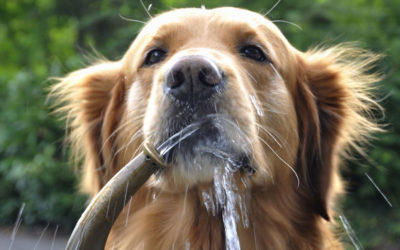Very Common, Usually Not Serious
Canine infectious tracheobronchitis (kennel cough) is one of the most prevalent infectious diseases in dogs. Fortunately, the majority of cases are not serious, resolving on their own in 1 to 2 weeks.
But because some dogs develop life- threatening complications (generally animals with preexisting health issues that compromise an animal’s immune system), you should take precautions to prevent your dog from becoming infected with this highly contagious disease.
Causes of Kennel Cough
Kennel cough can be caused by a number of different airborne bacteria (such as Bordetella bronchiseptica) and viruses (such as canine parainfluenza) or a mycoplasma (an organism somewhere between a virus and a bacteria). Typically, more than one of these pathogens (disease-causing agents) must bombard the dog at once to trigger illness.
Such a multifaceted attack is most likely to occur when a dog spends time with other dogs. Dog parks, dogs that attend dog shows, travel frequently, or stay at kennels have a higher risk of developing kennel cough than do dogs that stay at home most of the time. If you have ever had children in school or day care you understand how easy colds and flu can be spread around.
Signs and Symptoms
The primary sign of kennel cough is a dry-sounding, spasmodic cough caused by pathogens that induce inflammation of the trachea (windpipe) and bronchi (air passages into the lungs). At the end of a coughing spell, a dog will often retch and cough up a white foamy discharge.
Some dogs also develop conjunctivitis (inflammation of the membrane lining the eyelids), rhinitis (inflammation of the nasal mucous membrane), and a nasal discharge. Affected dogs usually remain active and alert and continue to eat well. But if you suspect your dog has kennel cough, isolate it from other dogs and call your veterinarian.
We can typically diagnose kennel cough from a physical exam and history. The cough is very characteristic and can be easily elicited by massaging the dog’s larynx or trachea But if the dog is depressed; feverish; expelling a thick yellow or green discharge from its nose; or making abnormal lung sounds, our staff veterinarians may want to perform diagnostic tests such as a complete blood count (CBC) chest x-ray, and laboratory analysis of the microorganisms inhabiting your dog’s airways. These tests can help determine whether the dog has developed pneumonia or another infectious illness such as canine distemper.
Immunization can be an important part of a kennel. But since the illness is caused by multiple organisms – making effective immunization difficult (NO VACCINE IS 100%) – you should focus on minimizing your dog’s exposure to the disease-causing organisms themselves.
Don’t share your dog’s toys or food and water bowls with unfamiliar dogs. And if your dog is in an indoor kennel, make sure the indoor area is adequately ventilated so airborne organisms are transferred outside.
Treatment
If your dog is suspected to have kennel cough, we will likely prescribe an antibiotic to help prevent any secondary bacterial infection and a cough suppressant. It is imperative that a proper veterinary examination and appropriate diagnostics be performed. Before any treatment regimen is administered you will be notified.
More From the Blog
Pet Vaccinations
A sensible and easy way to protect your pet from the most common and serious diseases.
Doggy Daycare
The exercise, socialization, and TLC your pal needs while you’re away.
Pet Grooming
Your pet will love our friendly and experienced groomers.
Pet Diagnostics
Our on-site labs give us accurate results quickly and efficiently.
Preparing for Blood Work
To help ensure acurate results.





